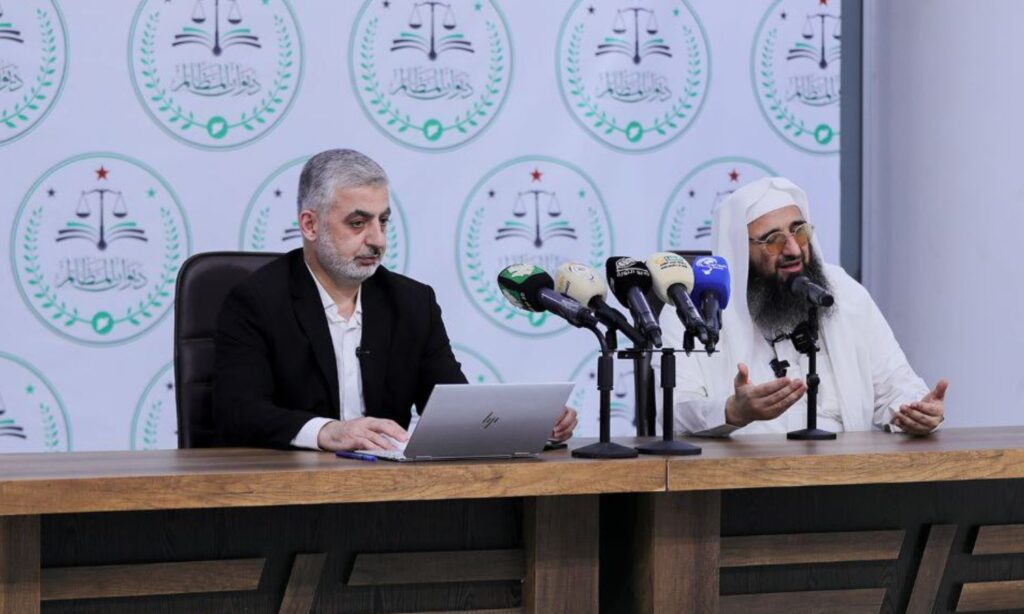The Hayat Tahrir al-Sham (HTS), which has military control in Idlib, announced the formation of a supreme committee for the Board of Grievances (Diwan al-Mazalim), comprising Ali Keda as its head, with Ibrahim Shasho and Hussein al-Salama as members, to ensure transparency and integrity in dealings between governmental institutions and the populace.
Three figures, some of whom have held positions in the Syrian Salvation Government (SSG), and others who have played roles alongside the HTS, now head the Board of Grievances. Its goal is to enhance justice and protect individual rights in the region, raising questions about whether it can meet the people’s demands and its usefulness amidst Abu Mohammad al-Jolani’s monopolistic rule in Idlib.
The formation of the Board of Grievances is one of several reforms launched by the Salvation Government, the General Shura Council, and al-Jolani, based on the outcomes of his recent meeting with local elders in March, amidst protests demanding al-Jolani’s ouster since the beginning of this year.
What is the Board of Grievances?
On June 27, HTS announced the formation of a supreme committee for the Board of Grievances aimed at enhancing justice and protecting individuals’ rights in the region. Four days later, a conference was held on July 1 to introduce it, which Enab Baladi attended.
The head of the Board of Grievances, Ali Keda, served as the head of the Salvation Government for four years from 2019 until January 2024.
Ibrahim Shasho held the position of Minister of Justice in the Salvation Government in 2017, and later served as Minister of Awqaf and Guidance until he was succeeded by Hossam Haj Hussein in the fourth government formation in December 2020.
On May 13, Shasho headed the Judicial Inspection Authority in the Ministry of Justice in the Salvation Government, in response to protesters’ demands to release detainees, empty prisons, and hold violators accountable.
Directly related to al-Jolani
Ali Keda told Enab Baladi that the Board of Grievances comprises five sections: government grievances, security grievances, military grievances, economic grievances, and judicial grievances. It includes individuals with extensive administrative, judicial, and military experience in the north, acting as a reference for any event that might occur within the region.
The Board of Grievances’ work is expected to start after July 15, following the completion of building preparations, reception offices, complaints and investigations offices, and meetings with all officials from government, security, military, judicial, and economic sectors, and drafting memorandums of understanding to establish effective communication methods.
Keda mentioned that the Board of Grievances has broad authority over all bodies in the region and is directly related to the “Leadership of the Liberated Areas”, referring to “Abu Mohammad al-Jolani”. It is expected to be efficient and swift in resolving issues and demands it receives from the populace.
The Board of Grievances building consists of five floors and is located in the middle of Idlib city near the Directorate of Education building.
During the conference, Keda stated that each complaint has a time frame for consideration and resolution, depending on the nature of the complaint. Some complaints may have many branches, while others can be resolved within an hour.
Regarding the transparency of the Board of Grievances’ work, Ibrahim Shasho stated that the Board of Grievances was established to reverse grievances, ensure rights, and enhance justice among people, and that transparency is not a matter that can be overstated.
A political tool
Researcher on Jihadist groups and religious movements, Abdulrahman al-Haj, sees the Board of Grievances as a functional tool to consolidate al-Jolani’s power, considering that the Board of Grievances will have some “green lines” to be objective, but in the end, it will also have “red lines” that it will not cross.
Al-Haj told Enab Baladi that the idea of the Board of Grievances under an authoritarian individual rule inherently makes al-Jolani both opponent and judge, as everyone knows these are his men, and there is no such thing as an independent judiciary.
The researcher does not believe the Board of Grievances is a belated step in response to the continuing protests since February, demanding al-Jolani’s ouster in Idlib. On the contrary, it is a step that comes as part of a series of maneuvers by al-Jolani to dismantle his opponents and end the crisis he found himself in.
Al-Haj added that al-Jolani did not previously consider such an idea, but he found in it an opportunity to resolve the remaining issues his opponents rely on and close that chapter.
The Board of Grievances is a political tool for consolidating power for al-Jolani, not a tool for consolidating the authority of the law and achieving justice.
Dr. Abdulrahman al-Haj, Researcher in Jihadi groups and religious movements
The strings in al-Jolani’s hands
The Salvation Government, composed of 11 ministries, controls the aspects of life in Idlib province, northern Hama countryside, and part of western Aleppo countryside administratively and in services.
The HTS indirectly controls the region economically and in services, accompanied by accusations that it is behind several projects described as “monopolistic“.
Since February, peaceful popular protests have continued in various areas of Idlib and its countryside and Aleppo countryside, demanding al-Jolani’s ouster and the emptying of prisons and releasing detainees.
The HTS and the Salvation Government have made several promises and reforms, including a general amnesty with conditions and exceptions, forming committees to listen to the populace, canceling building fees, and partially exempting them under certain conditions, but this has not prevented demonstrations.
Protesters considered these reforms “superficial and on the fringes” and do not meet their demands, circumventing the main demand.
Researchers and governance experts explained in a previous report prepared by Enab Baladi that the overall governance system in Idlib could roughly be described as a presidential system in all executive, legislative, and military channels, attributable to Abu Mohammad al-Jolani, who tries on his part to build these authorities. It is apparent that he holds the strings of the game completely in making decisions.











